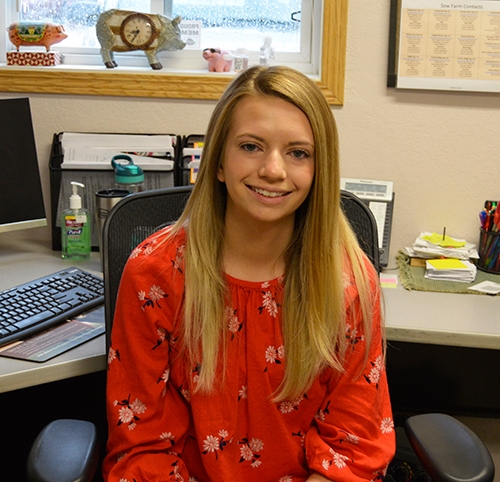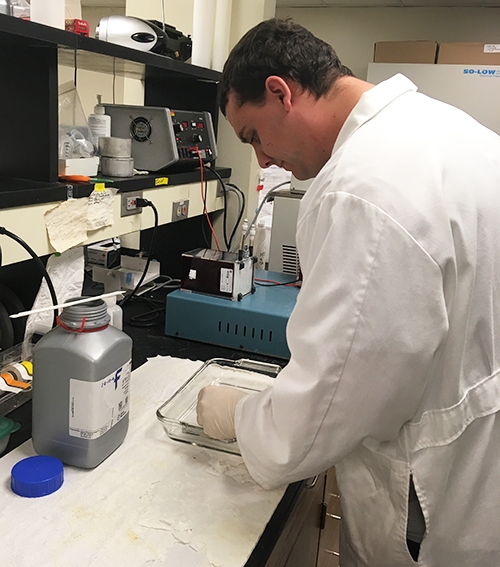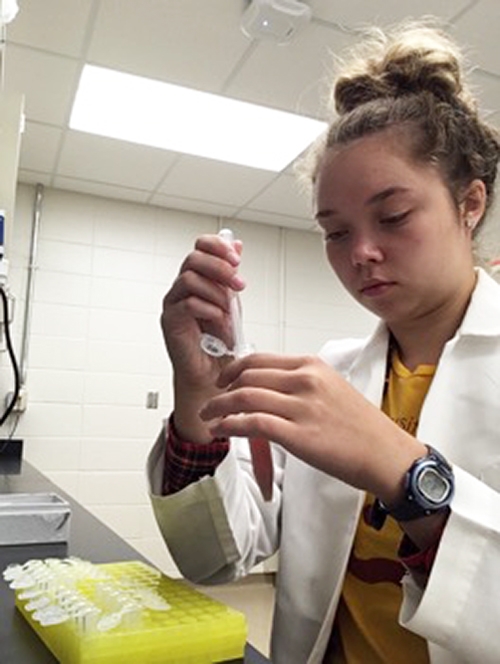You are here
Home ›When the blue jacket leads to the real world: The impact of FFA involvement in the educational and career paths of three high school graduates

Michelle Winkie ... Photo by Robin Johnson.

Matt Schulte ... Submitted photo.

Erika Johnson ... Submitted photo.
by David M. Johnson
When individuals are attending school in their early youth, they generally do not give much thought, much attention, to what lays ahead after their education is completed. Many may take it for granted that things will fall into place and they will land that “dream” job or became a member of that occupation that the older generation of their family was involved in.
Today, there is more of an emphasis and concentration on early development, as early as grade school and progressing into middle school and then high school. Many students do not just choose classes to “get by” but classes and subjects that prepare them for their employment later in life.
In addition to course work that can give them a beginning foundation for either a college degree or an associate degree for their desired professional employment after school, there are also many extracurricular and organizational offerings that can further shape the future direction of a person’s life. One such organization that assists in shaping a student’s future and is found in many schools, especially rural schools, is FFA.
Once known as the Future Farmers of America, the organization is now known as simply FFA due to the influx of urban participation in the organization. All three school districts in Allamakee County have FFA chapters and a solid number of students within their ranks.
In rural school districts and rural communities, there is often the encouragement of the student population to get an education and if not return to the communities for employment, at least become immersed in employment that is part of the agriculture landscape. The Waukon High School Little Switzerland FFA chapter has had success in developing the advancement of its members into positive success in educational and professional endeavors of many of its former members.
Three former members of that Little Switzerland FFA Chapter - Michelle Winkie, Matt Schulte and Erika Johnson - have shared their experiences through participation in that local chapter and how that participation has shaped their respective educational and career paths. That trio includes a college undergraduate and a graduate student making successful strides in their educational journey, plus, a former member that received her college degree and then gained employment in the local agricultural landscape.
Michelle Winkie, a 2014 Waukon High School graduate, did not really choose a future in agriculture until her senior year in high school. Raised on a farm outside of Waukon, she had been considering a future in Physical Therapy, but after all those years on the farm and an active FFA participation she felt that acquiring a degree in agriculture was the right move for her.
Matt Schulte, a 2012 Waukon High School graduate, grew up on a typical county farm with both livestock and crops being part of the surroundings that made his choice to remain in agriculture easy for him. He grew up in an environment where his parents and his FFA involvement were instrumental in inspiring him to continue the path of not necessarily becoming a farmer but a path that would help and assist other farmers.
Erika Johnson, a 2017 Waukon High School graduate, was the fourth generation member to be born into the family farm environment. With a background that included a farming interest from both sides of her parents’ families, she always knew that she wanted to be involved in the agricultural world. It was not until her senior year in high school, after several years of FFA involvement, that she became convinced that she wanted an Animal Science degree so she moved on from high school to Iowa State University.
Winkie, Schulte and Johnson all chose the same college that has a dominant reputation in agriculture, Iowa State. They all chose the same university but each traveled different avenues to attain the same ultimate goal, a degree that would fulfill their dream to remain in agriculture.
To jump start and encourage their involvement in ag-related careers, the FFA organization in their local high school was important in assisting in the development and providing the necessary education in the business of farming and the peripheral related areas.
Winkie chose to become involved in the CDE (Career Development Events) such as Meats Evaluation, Agronomy, Greenhand Quiz, Chapter Quiz and Chapter Display. She was recognized as the 2013 State Champion Agronomy Individual, the 2012-2013 Diversified Livestock Production Chapter Winner and as a member of the 2013 State Reserve Champion Agronomy Team.
Schulte was also deeply involved in the CDE competition, which included anything from Agronomy, Livestock Judging and Meats to Floriculture, Soils and Agricultural Sales. He also had the opportunity to evolve his personal Supervised Agricultural Experiences (SAE) which helped him to learn how to become an independent business owner and operator.
Johnson chose to become involved in CDEs such as Green Hand Quiz, Meat Evaluation, Extemporaneous Public Speaking and Veterinary Science. She and her Meats Evaluation team achieved placings of State Runner-up in 2016 and 2017, plus a team fourth-place finish in class and 10th-place overall finish in the 2016 National Western Roundup in Denver, CO. She and her team were also the 2016 State Runner-Up in Veterinary Science.
All three former members were on the chapter officer team in FFA. Winkie was Chapter Vice-President and Chapter Secretary, Schulte served for three years on the officer team, and Johnson was Chapter Secretary and Chapter Treasurer.
So, how did all these individual and team accomplishments build a foundation for a future in both college and career?
“In high school, I felt the most at home in Ag class and FFA. FFA allowed me to find my passion and learn about the diverse opportunities that agriculture has. It also exposed me to Iowa State as many of our contests and conventions were in Ames,” responded Winkie.
Being heavily involved in FFA prepared her for many endeavors in college. She was part of the Agricultural Business Club, Block and Bridle, Gamma Sigma Delta Ag Honor Society, Bacon Expo, Real Pig Farming Student Social Forces, and Beef Interest Group, plus she worked in the University Seed Science Center, with all of those aspects playing a big role in being part of her three-year college experience. Winkie graduated from Iowa State in 2017 with a degree in Agricultural Business and International Agriculture.
Schulte felt his FFA experience greatly impacted and influenced his choices in what college to attend and on what studies to concentrate on. He said the encouragement by his former FFA advisor, Nate Gebel, to become involved in the Meats CDE was a game changer for him. His individual top placings, along with team awards the rest of his high school career, led to greater and bigger things at Iowa State. By choosing the Meats CDE as a high school sophomore, Schulte was able to work his way on to the ISU intercollegiate Meats Judging Program. This was followed by involvement in the Block and Bridle Club Meats Interest Group and the Meats Science Club. These experiences led to a pursuit of a master’s degree in Meat Science and his current pursuit of a doctorate degree.
Schulte’s continued involvement in different meat science organizations, such as serving as the American Meat Science Association Student Board of Directors Midwest Director, again all came about with one decision made in FFA and high school that led to all of these achievements.
Because of the influence of his advisor, he felt he, in turn, could be helpful to others in FFA. He started by coaching a Meats team for the Little Switzerland Chapter, of which Johnson was a team member of that team.
“The team of girls had a passion to learn and strived to do very well at each contest we attended for the two years that I coached them, and they left a significant impact on my passion for teaching the younger generations,” remembers Schulte, who hopes to someday be involved in FFA again.
Johnson’s busy involvement in FFA, like Schulte and Winkie, has led to a busy collegiate schedule in her first two years at Iowa State. She too has become a member of the Block and Bridle Club and the Meats Science Club, which encouraged her to try various employment opportunities dealing with her degree choice in Animal Science. She has worked at the Lauren Christian Swine Teaching Farm, then at two nutrition labs for a graduate student through a program called Science With Practice, and for a USDA lab as a research assistant.
The undergraduate research she has conducted, “The Effects of Dietary Protein Oxidation of Growing Pigs,” garnered her recognition at the prestigious National Conference on Undergraduate Research in Atlanta, GA earlier this year. She was one of 4,000 undergraduate students from across the United States who presented their science research at that national forum.
Johnson credits her FFA experience of being part of the Officer’s Team and the demand of being able to present oneself and communicate the ideas and goals as beneficial to her national research presentation opportunity. She said working alongside her classmates and advisor Jessica O’Connor was life changing and prepared her for a challenging schedule. Being involved in the many activities in college, including a semester as an Animal Science Peer mentor and tri-chair for different events, have further influenced Johnson to continue her education and pursue a doctorate degree.
All three former Little Switzerland chapter members have immersed themselves in ag-related activities and still were able to maintain very high academic levels throughout their educational careers. All have participated in challenging internships intertwined with their time-consuming college experience.
Winkie has graduated and has moved on into ag business, working since graduating from Iowa State as the Human Resources Manager at Waukon Feed Ranch back in her hometown. In that role she is able to share information about agriculture through public relations events and gets to help others, many who initially know very little about farming or agriculture, find careers and become passionate about agriculture.
Schulte is continuing his research as he completes his journey to a doctorate degree. Johnson is also completing her college challenge with continued pursuit of her bachelor’s degree before finishing with her desire for a doctorate in animal physiology or animal reproductive physiology, so as to continue a career in research as a principle investigator.
All three recommend to those individuals that might be considering a career in agriculture to not be afraid to leave their comfort zones. They feel each person should pursue early in their high school careers the different avenues that exist to expand and develop the beginnings of their chosen targets to success.
Winkie encourages each student and states that, “I would highly recommend being an active member in FFA, getting involved in as much as you can so you can find out what area interests you most.”
Schulte adds, “FFA is one of the most empowering, enticing and amazing opportunities in high school as well as college. Don’t be afraid to reach out to your peers or mentors, either.”
Johnson concurs by suggesting, “Get involved and don’t be afraid to say yes! If one enjoys the atmosphere in FFA, definitely join a 4-H club. 4-H has given me endless opportunities that helped me grow into a better communicator and leader.”
What about if he or she wants to farm? Is the FFA or 4-H experience enough or does that individual require a college degree to be successful in farming?
Winkie believes a four-year degree would be great, but a two-year degree from a community college would be more than adequate. Johnson agrees that with the increasing advances in technology it would be instrumental to have a post high school education.
Schulte has witnessed friends who have attained or are attaining four-year degrees and how that extra knowledge has been a positive. His friends have learned the science behind how farms operate and how to successfully use resources available to them.
All three are moving through life and seeing many of their dreams and desires reaching fruition. Winkie and her fiancé have purchased his grandmother’s farm, hoping to expand their cattle herd and raise crops while continuing to grow in her job with Waukon Feed Ranch. She looks back on how she matured from high school into college and feels blessed with that experience and the internships that prepared her for her present position in life.
Schulte has always had the dream to farm, and looking back at how he developed as a person from the time he was in high school to where he is today, he might realize that dream. His development in his pursuits at Iowa State and his successes bode well for him.
Johnson’s only regret was that she would like to have had more hands-on experiences in the agricultural field before graduating from high school. She felt it was important to experience the whole atmosphere of what high school had to offer. She was heavily involved in not only FFA and 4-H but in band, drama and sports, activities that she felt was time well spent. But, with her interests spread out, she looks back on this period as a time where she wishes she could have spent more time in ag-related activities.
The three former Little Switzerland chapter members do not have any regrets from their experience in FFA. All three were raised in both a rural and agricultural environment, but with the additional FFA involvement in high school, they were provided additional access to their dreams.
The numbers of farmers in the county, in the state, and in the nation are getting fewer and fewer. That is why it is important that there exists organizations and opportunities that provide the possibilities for each individual to grow and choose a field in, if not farming, agriculture. The testimony of these three, who at one time wore those famous “blue jackets,” shows how necessary it is to have that chance, that avenue, to become members of an industry that feeds and clothes the world.

